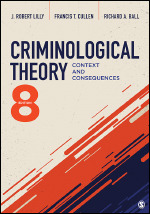Criminological Theory
Context and Consequences
Eighth Edition
- J. Robert Lilly - Northern Kentucky University, USA
- Francis T. Cullen - University of Cincinnati, USA
- Richard A. Ball - Pennsylvania State University, Fayette
March 2024 | 744 pages | SAGE Publications, Inc
Offering a rich introduction to how scholars analyze crime, Criminological Theory: Context and Consequences moves readers beyond a commonsense knowledge of crime to a deeper understanding of the importance of theory in shaping crime control policies. The Eighth Edition of this clear, accessible, and thoroughly revised text covers traditional and contemporary theory within a larger sociological and historical context. The latest edition includes new sources that assess the empirical status of the major theories, a new chapter on Black Criminology, and expanded coverage of important perspectives, such as the explanation of white-collar crime and the relationship of immigration and crime.
Included with this title:
LMS Cartridge: Import this title's instructor resources into your school's learning management system (LMS) and save time. Don't use an LMS? You can still access all of the same online resources for this title via the password-protected Instructor Resource Site. Visit the "Resources Tab" on this page to learn more.
Included with this title:
LMS Cartridge: Import this title's instructor resources into your school's learning management system (LMS) and save time. Don't use an LMS? You can still access all of the same online resources for this title via the password-protected Instructor Resource Site. Visit the "Resources Tab" on this page to learn more.
Chapter 1. The Context and Consequences of Theory
Chapter 2. The Search for the "Criminal Man"
Chapter 3. Rejecting Individualism: The Chicago School
Chapter 4. Crime in American Society: Anomie and Strain Theories
Chapter 5. Society as Insulation: The Origins of Control Theory
Chapter 6. The Complexity of Control: Hirschi's Two Theories and Beyond
Chapter 7. The Irony of State Intervention: Labeling Theory
Chapter 8. Social Power and the Construction of Crime: Conflict Theory
Chapter 9. The Variety of Critical Theory
Chapter 10. The Gendering of Criminology: Feminist Theory
Chapter 11. Crimes of the Powerful: Theories of White-Collar Crime
Chapter 12. Bringing Punishment Back In: Conservative Criminology
Chapter 13. Conservatism in Context: Contemporary Developments
Chapter 14. Choosing Crime in Everyday Life: Routine Activity and Rational Choice Theories
Chapter 15. The Search for the "Criminal Man" Revisited: Biosocial Theories
Chapter 16. New Directions in Biosocial Theory: Perspectives and Policies
Chapter 17. The Development of Criminals: Life-Course Theories
Chapter 18. Black Criminology: Theories of Race and Crime
Supplements
Instructor Resource Site
Online resources included with this text
The online resources for your text are available via the password-protected Instructor Resource Site, which offers access to all text-specific resources, including a test bank and editable, chapter-specific PowerPoint® slides.
Online resources included with this text
The online resources for your text are available via the password-protected Instructor Resource Site, which offers access to all text-specific resources, including a test bank and editable, chapter-specific PowerPoint® slides.

